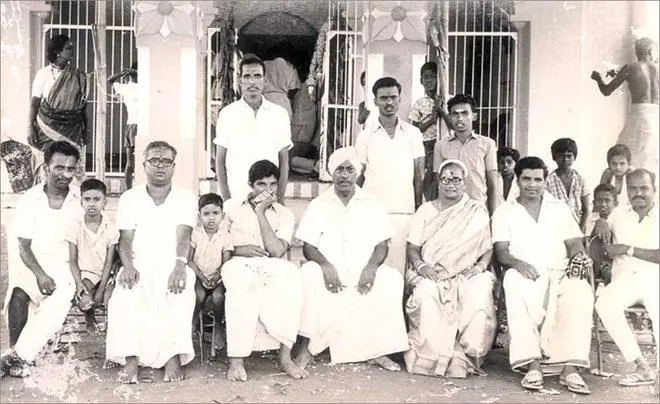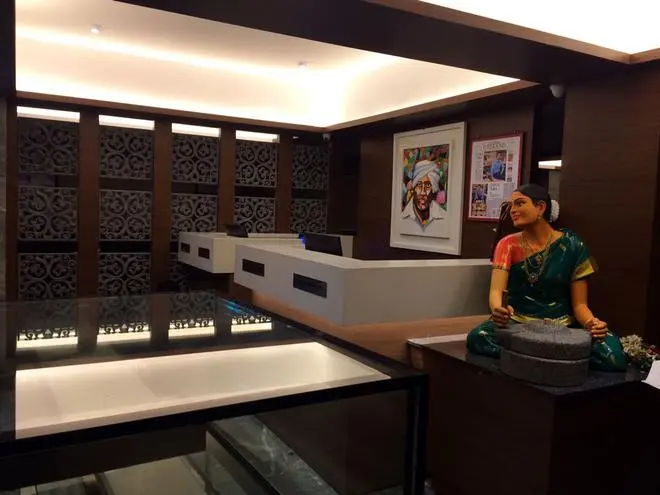Outside South India, many people may not even have heard of Dindigul. But one brand hopes to change that. The pace at which biryani chain Dindigul Thalappakatti is expanding could make the Tamil Nadu town, known for its locks and goat meat rice preparation, a household name across India. Third generation restaurateur, biryani baron Nagasamy Satish Dhanabalan has large grains of ambition.
This February, the biryani brand opened its 100th store when it launched a 3,000 sq ft outlet in Salem. The expansion strategy, says Dhanabalan is to first fully penetrate Tamil Nadu, Kerala and Karnataka, and then saturate Telangana and Andhra Pradesh before heading north. Though the chain already has flown abroad with outlets in California, France, Dubai , Malaysia, Singapore and Sri Lanka.
Strong family legacy

Nagasamy Satish Dhanabalan
The fit-as-a-fiddle Dhanabalan — he developed six packs gymming during the pandemic and is a superb dancer — says little did he imagine when he set up the Chennai outlet, that it would become such a large chain. Indeed, his moving to Chennai itself was a twist of fate. The chain owes its origin to his grandfather’s biryani joint Anandha Vilas, set up in Dindigul in 1957.
“My grandfather used to wear a turban and sit near the cash counter. When people saw him, they called him Sir Thalappakati (Sir Turban). When my father took over the restaurant, he renamed it as Thalappakati. It is a strong brand name as it was created by the people,” says Dhanabalan, who studied hotel management in Mangalore and then went to the UK to do an MBA in hospitality. His turbaned grandfather is also the inspiration for the brand’s logo.

Sir Thalappakati with his family
On his return he would have stayed rooted in Dindigul, if not for his wife Deepika, a fashion designer, who wanted to live in Chennai. So he opened an outlet there, it was a big hit, and the rest is history.
Expanding tables
Isn’t the calibrated strategy to expand across India a tad risky? What if other biryani brands, say a Biryani by Kilo, decide to add the unique flavours of Dindigul to their menu?
Dhanablan says because the chain follows a central kitchen strategy, at least six to seven outlets are needed before he can think of launching in a new city. “All the outlets are owned by the chain, with Dhanabalan ruling out the franchise route. While that’s expensive, ₹235 crore funding by a consortium led by CX Partners, which now owns 51 per cent stake in the chain, has spurred the expansion.

Regarding the other biryani brands, Dhanablan says they are all mostly driven by online orders. “My strategy is totally retail,” he stresses. “When you get the customer into the restaurant, there is better brand recall. We serve the biryani on a banana leaf — we create a whole experience,” he says.
During Covid times, of course, the brand had to move into delivery mode. “In 2019, just 20 per cent of our sales came from delivery, now it is touching 35 per cent — an increase of 15 per cent ,” he says .
The other reason for a calibrated approach, he says, is that in many States, people associate biryani with long grain rice, whereas the Dindigul Biryani is made with short grain ‘seeraga samba rice’. So he knows he will have his work cut out convincing consumers to accept and enjoy biryani made with this variant of rice. The strategy is to offer a long grain version too at some places in addition to the authentic one, he says. There is a clear localisation strategy too as the other dishes on the restaurant menu varies across regions. “In Kerala, we offer some fish dishes too as sides,” he says.
Dhanabalan is clear that the positioning of the biryani chain will be mass, and the price of a plate will be between ₹250-₹350 depending on the city. In a small town like Palani it will be priced at ₹250, while a city like Bangalore, it might be priced at ₹350.
The multifaceted Dhanabalan who has even acted in movies has relied on star power to grow the biryani brand, with Sarath Kumar as brand ambassador. But it’s the animated TVC starring a turbaned figure modeled on his grandfather that has his heart. Thatha must be smiling.




Comments
Comments have to be in English, and in full sentences. They cannot be abusive or personal. Please abide by our community guidelines for posting your comments.
We have migrated to a new commenting platform. If you are already a registered user of TheHindu Businessline and logged in, you may continue to engage with our articles. If you do not have an account please register and login to post comments. Users can access their older comments by logging into their accounts on Vuukle.